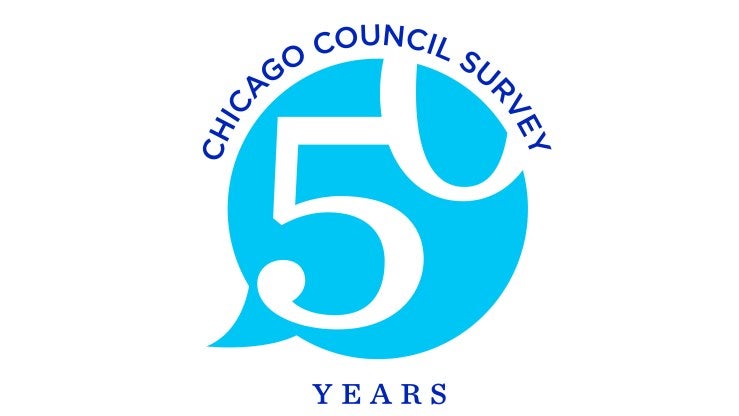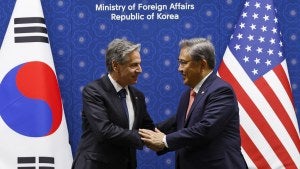Seven in 10 say the security relationship with Seoul does more to strengthen US national security than weaken it.
As the 2024 presidential election nears, the American public is being offered two clear paths forward on the US alliance system. Vice President Kamala Harris has indicated that under her administration it would be business as usual. Allies would remain a key pillar of US foreign policy just as they have for the past 70 years. Former President Donald Trump, however, presents a starkly different path.
In his first term, Trump upended decades of US foreign policy orthodoxy by calling into question the US commitment to defend its allies around the world. One of his primary focuses was South Korea, threatening to withdraw US troops unless there was a massive increase in South Korea’s contribution to a cost-sharing agreement. He also openly mused that US allies should have their own nuclear weapons. With Trump once again a candidate, the 2024 Chicago Council Survey put those sentiments to the American public and found that it favors the close traditional relationship with South Korea.
Key Findings
- Seven in 10 (69%) say the US security relationship with South Korea does more to strengthen US national security than it does to weaken it (26%).
- Two-thirds of Americans (63%) support long-term US military bases in South Korea.
- If US troops were withdrawn from South Korea, Americans say it would have a negative impact on US security (51%), South Korea’s security (67%), security in the Asia-Pacific (65%), and the alliance between the United States and South Korea (62%).
- Half of Americans (51%) favor using US troops to defend South Korea if North Korea invaded.
- Four in 10 (43%) support accepting North Korea as a nuclear state and entering arms control discussions with North Korea’s leadership.
Americans Say South Korea Does More to Strengthen US National Security, Oppose Troop Withdrawal
The United States currently stations roughly 28,500 soldiers in South Korea. Maintaining those long-term bases garners strong support from the American public. Roughly two-thirds of Americans (63%) say the United States should have long-term bases in South Korea, on par with Germany (64%) and Japan (62%). Majorities have supported bases in South Korea since the question was first asked in 2002, ranging from a high of 74 percent in 2018 to a low of 60 percent in 2010 and 2012. That support has always been strongly bipartisan.1
Trump, however, has repeatedly called for the removal of US troops from South Korea. He claims that South Korea does not pay its fair share for the stationing of US troops and should ultimately be responsible for its own defense.2 The American public rejects this view that alliances are not worth costs the United States pays to maintain them. But a substantial subset of Republicans are concerned about the related costs.
When asked about the costs and benefits of alliances, a majority of Americans (64% combined) say US security alliances benefit both the United States and our allies (51%) or mostly benefit the United States (13%). Among Republicans, a majority (55% combined) see US alliances as benefitting both the United States and its allies (45%) or primarily benefitting the United States (10%).
However, a significant portion of Republicans (43% combined) say these alliances mostly benefit US allies (39%) or benefit neither country (4%). Among this group, concerns about costs appear to be a motivating factor: 64 percent say allies do not pay their fair share, and 46 percent think allies increase the cost of defense for the United States.
Even among this limited group of Republicans focused on the costs associated with alliances—just 183 respondents in total out of 2,106—a majority (62%) say the relationship with South Korea does more to strengthen US national security compared to 33 percent who say it does more to weaken US national security. This is only somewhat lower than the American public overall, where 69 percent say the security relationship with South Korea does more to strengthen—versus 26 percent weaken—US national security.
These positive views on the role that South Korea plays in US national security likely influence the public’s perception that withdrawing US troops from South Korea would negatively impact a range of security issues.
In an August 2024 Council-Ipsos poll, half of Americans (51%) said they think withdrawing US troops from South Korea would negatively impact US security, 67 percent say it would negatively impact South Korea’s security, and 65 percent say it would negatively impact security in the Asia-Pacific. As for the US alliance with South Korea, 62 percent believe withdrawing US troops would have a negative impact.3 Importantly, these views are consistent across partisan groups, with Republicans and Democrats in close agreement on the potential consequences of pulling US troops from South Korea.
Americans Unsure about a Nuclear Ally
The possibility of troop withdrawal under a second Trump administration has sparked serious discussions in Seoul about the steps South Korea would take in the event of a full US troop withdrawal. The most serious aspect of those discussions has been the potential for South Korea to develop an indigenous nuclear weapons program. Polling in South Korea—including a survey conducted by the Council in South Korea in 2022—has consistently found two-thirds of South Koreans support an indigenous nuclear weapons program.
The American public, however, is difficult to read on how it would react to an American ally developing nuclear weapons. In the August Council-Ipsos poll, two-thirds of the American public (63%) thinks no country should have nuclear weapons and should rely on conventional military power to defend themselves. That, of course, may be the ideal but is not the world as it currently exists. When it comes to allies developing nuclear weapons, Americans are evenly split. While 17 percent say US allies should have nuclear weapons to better defend themselves, 16 percent say US allies do not need nuclear weapons and should rely on the US promise to defend them if they are attacked.
How these numbers might shift if an ally took steps to pursue a nuclear weapons program is impossible to predict. However, in a survey conducted in 2021, Americans were asked directly if the United States should try to prevent or allow South Korea to pursue its own nuclear weapons program. At that time, 63 percent of Americans, 60 percent of Republicans, and 65 percent of Democrats agreed that the United States should try to prevent South Korea from pursuing such a program.
Potential North Korea Fatigue
Americans’ opposition to a South Korean nuclear capability may be due in part to the fact that a majority of the American public (51%) continues to favor the use of US troops to defend South Korea if North Korea invaded. This includes half of Republicans (52%) and Democrats (54%). While this is down from the previous high of 64 percent in 2018, this decline is most likely a recalibration of the threat from North Korea while living amid the current conflicts in Ukraine and the Middle East. North Korea’s missile launches and threats now appear to receive less attention in the US media, and North Korea’s nuclear program is considered less of a threat now than in 2017. Moreover, in 2022, half of the American public (51%) said the United States had to learn to live with countries like North Korea and Iran possessing nuclear weapons, just as the United States does with China and Russia.
In terms of dealing with North Korea, the Biden administration has put the challenge on the backburner as wars in Ukraine and the Middle East dominate the foreign policy discussion. There is also no great push from the American public to deal with the challenge urgently. Half of Americans (52%) cite North Korea’s nuclear program as a critical threat. This places it middle of the pack among potential threats, roughly the same as international terrorism (53% critical), Iran’s nuclear program (53% critical), and Russia’s territorial ambitions (50%). Each of these trail the top threat of weakening democracy in the United States (67% critical).
But there is also the question of what is to be done about North Korea’s nuclear weapons program—a challenge with notoriously few good options. A majority of Americans (82%) favor continuing to isolate and pressure North Korea with economic sanctions. This has been the basic approach across multiple presidential administrations for the past 20 years to no avail. It is likely also seen as relatively cost free. One-quarter (24%) of Americans support taking military action to force North Korea to denuclearize. An August Council-Ipsos poll additionally asked whether to accept North Korea as a nuclear weapons state and meet North Korea’s leaders to discuss arms control agreements. Roughly four in 10 Americans support this approach (43%, 51% oppose).
Favorable Views of South Korea Remain at All-Time High
Even as successive US presidential administrations have given greater importance to the security dimensions of US foreign policy in Asia, the American public has yet to follow. A plurality (41%) say Asia is most important for future US economic growth, but just 22 percent cite its importance for future US military security.
Of course, South Korea is an increasingly important actor in the region given its economic and military power. However, Americans are not yet ready to place it in the top tier of influential countries there. The August Council-Ipsos poll finds that on a zero to 10 scale—where zero represents not influential at all and 10 is very influential—South Korea receives a score of 5.9. This puts it even with Russia (6.0) but below Japan (7.0), the United States (7.0), and China (7.9), but above Taiwan (5.1) and North Korea (4.7).
While Americans may not see South Korea as one of the most influential countries in the region, South Korea does remain one of the most favored countries among Americans in the region. In the August Council-Ipsos poll, South Korea’s favorability is 58 on a 0-100 scale, where 0 represents very unfavorable feelings and 100 is very favorable feelings. Of the Asian countries asked about, only Japan (65) is viewed more favorably among Americans. By contrast, China receives a 26 and North Korea just an 12, being the least favorably viewed country among Americans.
Conclusion
The 2024 US presidential election could prove to be a critical turning point in US foreign relations. Should Trump win a second term, the departure from US foreign policy orthodoxy that follows could drastically alter the security landscape as currently configured. This could include profound changes to the US-South Korea alliance. But this would not be done at the behest of the American public. Americans overall understand the importance of South Korea to US national security, remain committed to defending South Korea if North Korea invaded, and continue to rate South Korea as one of the most favorable countries in Asia. The question is whether that will be enough to halt the potential challenges facing a 70-year alliance.
- 1
See appendix for full partisan trend results.
- 2
South Korea currently contributes $1 billion to support the stationing of US troops in South Korea, and in 2022 it had the ninth-largest defense budget in the world, spending 2.7 percent of GDP on defense.
- 3
For details on this August survey, please see the methodology section at the end of this report.
This analysis is based on data from the 2024 Chicago Council Survey of the American public on foreign policy, a project of the Lester Crown Center on US Foreign Policy. The 2024 Chicago Council Survey was conducted June 21–July 1, 2024, by Ipsos using its large-scale nationwide online research panel, KnowledgePanel, in both English and Spanish among a weighted national sample of 2,106 adults 18 or older living in all 50 US states and the District of Columbia. The margin of sampling error for the full sample is ±2.3 percentage points, including a design effect of 1.1229. The margin of error is higher for partisan subgroups or for partial-sample items.
Additional data comes from two joint Chicago Council on Global Affairs–Ipsos surveys.
The first was conducted August 2–4, 2024, by Ipsos using its large-scale, nationwide, online research panel, KnowledgePanel, among a weighted national sample of 1,024 adults 18 or older living in all 50 US states and the District of Columbia. The margin of sampling error for the full sample is ±3.2 percentage points, including a design effect of 1.06.
The second was conducted August 23–25, 2024, by Ipsos using its large-scale, nationwide, online research panel, KnowledgePanel, among a weighted national sample of 1,028 adults 18 or older living in all 50 US states and the District of Columbia. The margin of sampling error for the full sample is ±3.2 percentage points, including a design effect of 1.11.
Partisan identification is based on how respondents answered a standard partisan self-identification question: “Generally speaking, do you think of yourself as a Republican, a Democrat, an Independent, or what?”
The 2024 Chicago Council Survey is made possible by the generous support of the Crown family, the Korea Foundation, and the United States-Japan Foundation.



Related Content
 Public Opinion
Public Opinion
Meanwhile, about half say North Korea's nuclear program is a critical threat.
 Public Opinion
Public Opinion
The public also remains in favor of maintaining long-term military bases abroad.
 Public Opinion
Public Opinion
While supporters of both parties see benefits in US security agreements, Republicans tend to be more concerned about the associated costs.
 Public Opinion
Public Opinion
Half favor using US forces to defend South Korea if invaded by North Korea, down from 55 percent in 2022.


